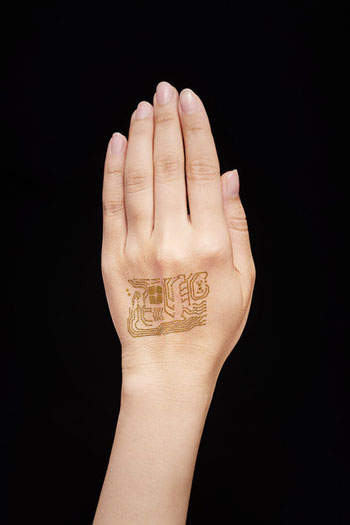Tattoos, in the last decade have become increasingly popular. However, now temporary tattoos are a big thing, and not just for their style.
A new wearable sensor has been developed to look and feel just like a henna tattoo, however it can monitor electrical muscle activity and body temperature, too.
Researchers have designed a new ultra-thin, lightweight, breathable sensor constructed from nanoscale mesh, a spaghetti-like entanglement of fibers a thousand times thinner than a human hair.
It can monitor vital signals over a long period of time without inflaming or irritating skin, a side effect of many current devices.
Takao Someya, Professor in the University of Tokyo’s Department of Electrical Engineering and Information Systems commented: “We succeeded in completely removing the discomfort of wear.”
Dr Someya continued: “People cannot even feel the existence of our devices on their skin.”
“The choice of materials in the sensor make it more breathable, reducing skin irritation,” said Dr Someya.
Often made from a form of polyester or rubber sheets, there are existing wearable electronics that can provide good readings. However, they do not allow enough air to pass through.
This can prevent sweating and often cause itchiness, redness or other irritation, making them unsuitable for long-term use.
More comfortable for the long-term
This new nanomesh device can theoretically be worn for a week or longer, and leave no such problems.
On the other hand, the drawback is that it can be rubbed off with water, so in reality, it will need to be replaced after every shower or bath.
There is a trade-off between how comfortable the device is and its durability, Dr Someya said, adding that this is an area of future research.

Made from nanoscale meshes containing a water-soluble polymer called polyvinyl alcohol and a layer of gold, the device can be applied similarly to children’s temporary tattoos.
With just a spray of water, this will dissolve the nanofibers in the patch, and stick it to the skin.
Using these materials, the device conforms to the varied textures of human skin, including sweat pores and fingerprint ridges. But, it will still let air in through tiny gaps.
Gold was used in the device for durability and softness.
However, it can be replaced with aluminum, as a more cost-effective method.
In a test to see how much water vapor could pass through the material, the nanomesh proved more permeable than thin plastic foil or rubber sheet.
In a recent study, twenty participants wore a patch of the nanomesh on their forearms for seven days and reported no inflammation.
The sensor can detect touch, temperature and pressure.
More importantly though, it can read the electrical activity of muscles just as reliably as conventional gel electrodes, the study shows.
The researchers hope the sensor will make it possible to monitor a patient’s vital signs without discomfort, and athlete’s physiological signals without impeding performance.
“We can see numerous potential applications in the medical field, also in sports and in people’s welfare everywhere,” Dr Someya said.
The sensors need some help
As the sensor cannot accomplish these tasks alone.
“It’s not a full integrated electronic system,” said John A. Rogers, a professor of materials science and engineering at Northwestern University, who was not involved in the study.
It needs to be combined with a power source and devices to read and transfer the data.
“It’s a component of a broader system that could have utility.” The real benefit of this new sensor is its nanoscale and flexibility, which provides a more intimate skin interface, Dr. Rogers added.
“What exists today is basically rigid blocks of electronics strapped to the wrist,” he said.
He added: “You can’t measure blood flow or blood pressure with that.”
In the future, this new sensor could be used to monitor vital signals of pregnant women or patients undergoing physical rehabilitation at home, he said.
Or maybe even capture muscle signals that can be used to control prosthetics.


Comments are closed, but trackbacks and pingbacks are open.